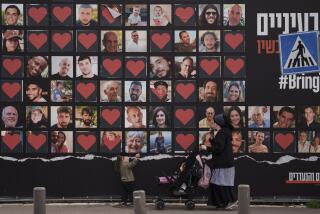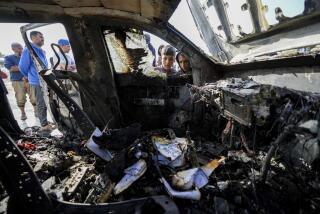Aid Agencies Helping Kurds Fear Iraq Is Behind Attacks : Mideast: The death of a Fijian U.N. guard appears to fit a pattern of violence against the organizations.
- Share via
ANKARA, Turkey — The slaying of a U.N. guard in northern Iraq fits into a pattern of attacks on aid agencies that seems to be part of President Saddam Hussein’s trial of strength with the international coalition lined up against him, diplomats, relief workers and Kurdish groups say.
The U.N. guard, a Fijian soldier, was shot to death while he slept in the city of Dohuk, 210 miles north of Baghdad. He was one of about 500 guards sent by the United Nations as a symbolic gesture to reassure aid agencies working in Iraq after the end of the Persian Gulf War.
But security has now become such a worry that one of the last major charities working in northern Iraq, a British group that for security reasons does not want to be identified, has decided to pull out most of its expatriate staff as a result of what it calls a clear campaign of harassment. The charity says one of its vehicles was tampered with, and a bomb was found under another.
In other incidents since July 1, a vehicle belonging to a U.N. agency was destroyed, a grenade explosion seriously injured two Austrian U.N. guards and a car bomb killed seven Iraqi Kurds traveling in a motorcade with Danielle Mitterrand, wife of French President Francois Mitterrand and a campaigner for the Kurdish cause.
No one has claimed responsibility for the attacks in Iraqi Kurdistan--a New Jersey-sized mountainous region also flanked by Turkey, Iran and Syria--but Western diplomats and other sources have no doubt that they are part of Hussein’s latest confrontation with the West.
“These are Iraqi attacks. They are trying to frighten the aid agencies away, and the policy is working,” said Serchil Qazzaz, representative in Ankara of a major Iraqi Kurdish party, the Patriotic Union of Kurdistan. “Relief workers are frightened to go out of their houses, and I don’t blame them.”
Western diplomats say not much can be done to directly protect the three major and 20 minor agencies still working there, despite the presence of Provide Comfort II, the 48-warplane, U.S.-led allied force based at Incirlik in southern Turkey to deter Iraqi attacks on the Kurds.
In recent months, Baghdad has also grown bolder in delaying and refusing visas and work permits vital for many groups.
The overall legal umbrella for relief action, the U.N. Memorandum of Understanding With Iraq, is also in some danger following Baghdad’s refusal to renew it on July 1. Diplomats say it is unlikely to be extended, thus paralyzing the work of the U.N. agencies charged with coordinating relief organizations.
“The aid effort is disassembling. I think there will be a coalition response in some way,” one Western diplomat said. “If you are going to be credible to a man like Saddam Hussein, you have to give a deadline, you have to be prepared to react.”
One European envoy termed it a trial of strength and added that “there was no question of the United Nations standing down this time. I think some limited military action may be engineered.”
Any deadline would probably be linked to the standoff over access to the Ministry of Agriculture in Baghdad rather than the less tangible issue of the aid agencies, the diplomats added. For almost two weeks, U.N. weapons inspectors have kept a vigil outside the ministry, saying they believe the facility contains data on Iraqi ballistic missiles. Iraq denies that the building contains any such information.
In a defiant, uncompromising speech marking the anniversary of the 1968 coup that put his Arab Baath Socialist Party in power, Hussein on Friday dismissed the U.N. Security Council as an “advertising agency” for the United States and called for the overthrow of pro-Western Arab leaders, such as those in Egypt, Saudi Arabia and Kuwait.
But it seems that the highest stakes have to do with the future of the Kurds in northern Iraq. It is there that the allies are protecting at least 3 million people as they slowly drift toward what looks like an independent Kurdish state.
A Kurdish Parliament for the region has met after the crude but democratic elections on May 19, with 50 seats each for the two main Kurdish parties and five for the Christian minority. The Kurds even formed a Cabinet on July 5 led by Fuat Masum, a doctor of Islamic law and a senior Kurdish guerrilla official.
The Kurds are still heavily dependent on allied protection, internal bickering is still rife, and progress toward a genuinely self-supporting state has been haltingly slow. The economy has been hit by a double blockade--the U.N. sanctions on Iraq and those applied to the Kurds by the Baghdad government itself.
There is no longer dramatic suffering in northern Iraq, but there is a creeping poverty, absence of basic medicines and services, and a need for outside help. Bernard Kouchner, France’s minister of health and humanitarian affairs and the most senior allied official to visit the region, has called for international aid to be supplied over the Turkish border.
“In an ideal world, that would be the solution,” said Joan Anderson of the British charity Save the Children.
More to Read
Sign up for Essential California
The most important California stories and recommendations in your inbox every morning.
You may occasionally receive promotional content from the Los Angeles Times.










